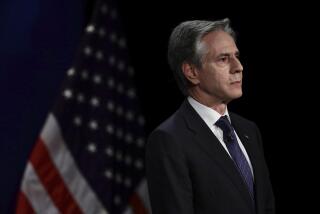U.S. pushes truce in Caucasus fighting
- Share via
WASHINGTON — With little leverage but large stakes, the Bush administration launched a delicate diplomatic effort Friday, using private and public pressure to try to bring a cease-fire to the Georgian republic of South Ossetia, where Russian and Georgian forces battled each other into the night.
The sudden military confrontation in the Caucasus left the United States in a particularly difficult position: It has promoted Georgia as a budding democracy in a troubled region. At the same time, its relations with Moscow have eroded just as it needs Russia’s support to counter Iran’s nuclear ambitions.
“It’s in absolutely nobody’s interest to have armed conflict, and we hope everyone will realize that quickly,” said a senior White House aide, speaking on condition of anonymity while discussing diplomatic efforts. “We can try to get them talking and to stop shooting.”
The Pentagon has about 200 troops in Georgia to train Georgian units deploying to Iraq. Georgia maintains about 2,000 soldiers in Iraq, the third-largest foreign force after the United States and Britain. But Georgian President Mikheil Saakashvili said Friday that he was calling his troops home to support the fight against Russia.
Pentagon spokesman Geoff Morrell said the Georgians had requested U.S. help in moving their troops. But he said the Pentagon was looking for a way to assist without appearing to support Georgian military operations against the Russians.
President Bush and Secretary of State Condoleezza Rice denounced the violence and called on Russia to respect Georgia’s territorial integrity. In Beijing for the Olympic Games, Bush spoke with Russian Prime Minister Vladimir Putin, also in attendance, and Rice called officials in the region.
The administration also dispatched a deputy assistant secretary of State, Matthew J. Bryza, as an envoy to the area.
Meanwhile, Defense Secretary Robert M. Gates and Adm. Michael G. Mullen, chairman of the Joint Chiefs of Staff, spoke with their Georgian counterparts, Morrell said.
Georgia has been a favorite of the Bush administration since the so-called Rose Revolution of 2003 swept in the pro-American Saakashvili.
The administration has lobbied in behalf of Georgia’s bid to join the North Atlantic Treaty Organization, while other alliance members have held back.
The problem facing Bush is his limited leverage with Russian leaders after years of tensions, said F. Stephen Larrabee, an expert at Rand Corp.
The Russians “don’t want to have a major conflict with the United States over this,” Larrabee said.
But Moscow put on a show of force to give Saakashvili “a black eye,” while hoping the U.S. would pressure the Georgian leader to accept a cease-fire and leave the pro-Russian breakaway region alone.
Another U.S. interest is a major pipeline carrying Caspian Sea oil through Georgia to Turkey, a transit point for fuel that reaches Europe and reduces the demand for oil elsewhere, thus easing purchases for use in the U.S. market.
“Georgia is an important partner for the United States in the Caucasus, probably the most important,” said Janusz Bugajski, director of the New European Democracies Project at the Center for Strategic and International Studies, a Washington think tank.
But Bush’s role is largely limited to diplomacy, or at most, logistical assistance to Georgia’s military.
“Obviously, we’re not going to march in over the hill to help the Georgians,” Bugajski said.
--
Times staff writer Noam N. Levey contributed to this report.
More to Read
Sign up for Essential California
The most important California stories and recommendations in your inbox every morning.
You may occasionally receive promotional content from the Los Angeles Times.










